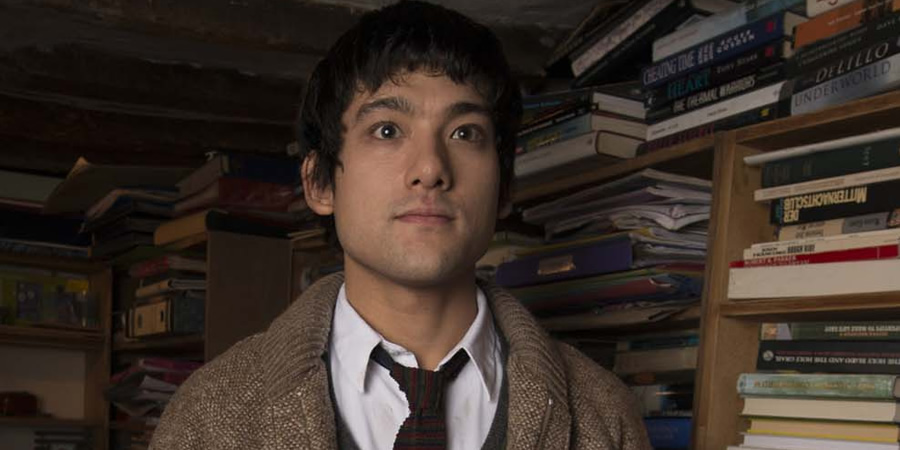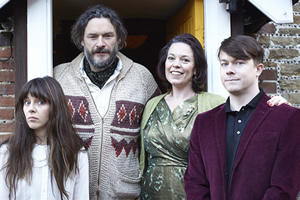Will Sharpe interview

Will Sharpe talks about writing, directing and acting in the first TV show he's created...
Flowers is not your average comedy-drama. Where did the idea for it come from?
The truth is there was no real agenda; Flowers came from trying to not think too hard about an angle or a target demographic or a genre. I wanted to try being completely uncynical. I guess the show is about melancholy and family, and it's about people feeling trapped or alone. It's also about how your own state of mind can affect those around you. I wanted to deal with everything sensitively and honestly, but I didn't have a plan.
The one thing I did know was that I wanted to write something that had a developing narrative throughout the series. I wanted to make sure there was no 'reset' button at the end of the episodes and that the series could work as one big story. This was something Channel 4 was very keen on too and it was the main reason I wanted to try making something for television as opposed to film.
Perhaps counter-intuitively, it was because I wanted to write something with longer story arcs. I also knew that I wanted it to be funny but not just funny. I felt like I wanted it to be a bit like a 'non-sitcom sitcom' - something that, while definitely a sitcom, finds its characters sort of breaking the sitcom format by questioning their own identities (and archetypes). As they start to challenge the other characters' perceptions of them - and in turn the audience's - I think the show evolves into something other than just a comedy.
Where did the scenarios come from, of the struggling children's author, the decaying marriage, the tumbledown country house?
Again, it wasn't based on any logic or plan. It was just where I saw the characters. I do like the dishevelled British countryside aesthetic, that sort of folky heritage thing. I suppose studying classical literature probably had an influence on the way I write and what I like imagining. Or maybe it's because I moved here from Tokyo and I couldn't believe how green the countryside was. The difficult family set-up probably came about because I generally find it more interesting trying to write about things that are hard or complicated and then trying to work out what might be uplifting about stuff that is seemingly just bleak.

As well as being very funny, Flowers is very sad. Do you like that juxtaposition?
I find it hard to take anything seriously if it doesn't have a sense of humour, and I don't find things funny if they don't have some kind of heart or basis in realistic emotional characters. So I'm constantly trying to find the right balance between those things. It has to be funny - life is funny, that's not a bad thing - but when something sad is happening, that should feel at least partly sad. But I do generally quite like holding contrasting ingredients up against each other; a sort of counterpoint. It's often quite an effective way of showing what is interesting and strange about whatever it is you're looking at.
Do you set out to make it a slightly unsettling watch for the viewer?
We never wanted it to feel deliberately or willfully dark. If it went to dark places, it had to be because that was where the characters were taking it. If there's an uncomfortable situation, then it can, and perhaps should, feel uncomfortable. It is at least partly a comedy, but I didn't want it to feel frivolous.
The show's got a timelessness to it - it could have taken place 30 years ago. There's no talk of mobile phones or wi-fi, the house is old and creaky and devoid of modern paraphernalia. Was that a conscious decision?
I wanted it to feel very close to the real world but a bit different - so yeah sort of timeless and a bit placeless. Maurice is a children's book author and I wanted some of that to bleed out into the rest of the Flowers world, to have a slight Brothers Grimm feel to it. I wanted it to feel like a nowhere place in a nowhere time. We applied this sort of thinking to the costumes, make-up and design across the board. It was something we took a lot of care over, including with location choices. The more we all talked about it, the more we gradually came to a common and more complete understanding of what this world was and what should or shouldn't be there.
How do you find the experience of writing?
I find it, at times, infuriating and very difficult. It depends on the day. It took me a while to realise you just have to show up and do it and that you don't really have any control over when you might have a good idea, or when something might become clear to you, but it won't come if you don't sit down and write. When it does come though it does feel like it's worth the wait; and to be honest it doesn't even feel like you're writing it, it feels like the show is deciding to make itself known and you're not really there. In a way, you write all the bits that you delete, and the show takes care of itself.
As well as writing and directing, you play Shun, Maurice's Japanese illustrator. What's his role in the series? He's an unusual character to plonk into the middle of the British countryside!
From a narrative point of view Shun's character is there partly to create tension, I think, between Maurice and Deborah. You might say he's the personification of Deborah's anxiety and insecurity, because he represents Maurice's work, as he works for Maurice, and also Deborah's sexual frustration, because of who she thinks he is. In another way, he brings to it a different kind of flavour. I lived in Japan till I was eight and grew up watching Japanese comedies on television, and from quite early on I knew I wanted some of that style to be in this show. Again I liked the clash between the very British ingredients and the Japanese ingredients and what seemed to happen when you threw them together. He's a very un-British character to hold the British characters up against, which maybe was helpful at times.
With Flowers you have a phenomenal cast. You must have been thrilled about getting them all on board, particularly as it's your TV directorial debut?
Yes. We couldn't really believe it. The whole cast is amazing. That was one of the nicest things about making this show was that you could point the camera at anyone and know that you would get something back. I got to meet and work with (and, in some cases, work again with) some really extraordinary actors. And obviously Julian and Olivia are both people that I've always admired and been excited about watching, let alone meeting.
Was it terrifying to direct such a prestige cast?
Sort of terrifying, yeah. It's terrifying and confusing and exciting, but once you're actually doing it, all of that kind of goes out of the window, because you've got a job to do. When you meet for the first time, maybe it's a bit strange, but in a work context less so, because you're focussed on something else - the scene - and then suddenly it's like working with anyone else in a way. Olivia and Julian are both very kind people and very rewarding to work with. I learned a lot from everyone but especially from them.

